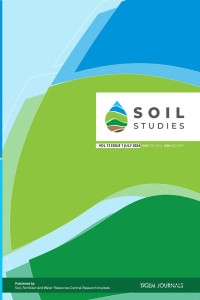Abstract
References
- Anonymous, (2018). Republic of Türkiye Ministry of Agriculture and Forestry. Regulation on Organic, Mineral and Microbial Fertilisers Used in Agriculture. Products of organic origin. Annex 3 (5-6-7).
- Aşik, S. (2008). Some chemical properties of some liquid humic acid soil conditioners [master’s thesis]. Ankara University Faculty of Agriculture.
- Chen, Y., & Avnimelech, Y. (1986). The role of organic matter in modern agriculture (25). Springer Science & Business Media.
- Enev, V., Pospíšılová, L., Klučáková, M., Lıptaj, T., & Doskočıl, L. (2014) Spectral Characterization of Selected Humic Substances Soil & Water Res., 9(1), 9–17. https://doi.org/10.17221/39/2013-SWR
- Erdik, E. (1998). Spectroscopic Methods in Organic Chemistry, Gazi Office Bookstore. Nicholas, R.E. (1968). Hermann, Paris. 147-153. https://doi.org/10.1055/b-003-108602
- Nieweś, D., Biegun, M., Huculak-Mączka, M., Marecka, K., Kaniewski, M., Zieliński, J., & Hoffmann, J. (2023). Extraction of humic acid from peat, lignite, and the thermal behavior of their mixtures with ammonium nitrate. Journal of Thermal Analysis and Calorimetry, 148(23), 13175-13188. https://doi.org/10.1007/s10973-023-12326-7
- Schnitzer, M., & Khan, S.U. (1978). Soil Organic Chemistry. Elsevier Book Series 8, 1-319.
- Shuangdui Y, Naiyu Z, Juan Li, Yanan W, Yue L, Mengyao C, & Qiuyan Y., (2021) Characterization of humic acids from original coal and its oxidization production www.nature.com/scientificreports.https://doi.org /10.1038/s41598-021-94949-0
- Ukalska-Jaruga, A., Bejger, R., Debaene, G., & Smreczak, B. (2021). Characterization of soil organic matter individual fractions (fulvic acids, humic acids, and humins) by spectroscopic and electrochemical techniques in agricultural soils. Agronomy, 11(6), 1067. https://doi.org/10.3390/agronomy11061067
- Yildiz, A., Genç, Ö., & Bektaş, S. (1997). Methods of Instrumental Analysis, Hacettepe University Press, a-64.
- Yonebayashi, K., & Hattori, T. (1988). Chemical and biological studies on environmental humic acids: I. Composition of elemental and functional groups of humic acids. Soil Science and Plant Nutrition, 34(4), 571-584. https://doi.org/10.1080/00380768.1988.10416472
Abstract
Humic acids are formed from a combination of variable chemical groups found in natural sources containing partially aromatic groups in an amorphous structure. These substances have been shown to significantly impact plant biomass, affecting nutrient distribution through direct interaction with the plant and nutrient supply and regulation through indirect interaction. The lack of a regular and repeating molecular structure in humic substances makes them challenging to determine. Humic substances used in agriculture commercially are humic and fulvic acid or combinations of both in different proportions. In our research, we used spectroscopic and thermal methods to understand the structures of commercial samples. We conducted FT-IR (Fourier Transform Infra-Red) spectroscopy to analyze the structure's bonds, thermal analysis to comprehend its thermal properties, and NMR (Nuclear Magnetic Resonance) analysis to obtain information about the carbon content. By combining, comparing, and interpreting all these methods, we can predict commercial samples' spectroscopic and thermal properties during the production stage. This can serve as a foundation for researchers studying or utilizing humic acid.
References
- Anonymous, (2018). Republic of Türkiye Ministry of Agriculture and Forestry. Regulation on Organic, Mineral and Microbial Fertilisers Used in Agriculture. Products of organic origin. Annex 3 (5-6-7).
- Aşik, S. (2008). Some chemical properties of some liquid humic acid soil conditioners [master’s thesis]. Ankara University Faculty of Agriculture.
- Chen, Y., & Avnimelech, Y. (1986). The role of organic matter in modern agriculture (25). Springer Science & Business Media.
- Enev, V., Pospíšılová, L., Klučáková, M., Lıptaj, T., & Doskočıl, L. (2014) Spectral Characterization of Selected Humic Substances Soil & Water Res., 9(1), 9–17. https://doi.org/10.17221/39/2013-SWR
- Erdik, E. (1998). Spectroscopic Methods in Organic Chemistry, Gazi Office Bookstore. Nicholas, R.E. (1968). Hermann, Paris. 147-153. https://doi.org/10.1055/b-003-108602
- Nieweś, D., Biegun, M., Huculak-Mączka, M., Marecka, K., Kaniewski, M., Zieliński, J., & Hoffmann, J. (2023). Extraction of humic acid from peat, lignite, and the thermal behavior of their mixtures with ammonium nitrate. Journal of Thermal Analysis and Calorimetry, 148(23), 13175-13188. https://doi.org/10.1007/s10973-023-12326-7
- Schnitzer, M., & Khan, S.U. (1978). Soil Organic Chemistry. Elsevier Book Series 8, 1-319.
- Shuangdui Y, Naiyu Z, Juan Li, Yanan W, Yue L, Mengyao C, & Qiuyan Y., (2021) Characterization of humic acids from original coal and its oxidization production www.nature.com/scientificreports.https://doi.org /10.1038/s41598-021-94949-0
- Ukalska-Jaruga, A., Bejger, R., Debaene, G., & Smreczak, B. (2021). Characterization of soil organic matter individual fractions (fulvic acids, humic acids, and humins) by spectroscopic and electrochemical techniques in agricultural soils. Agronomy, 11(6), 1067. https://doi.org/10.3390/agronomy11061067
- Yildiz, A., Genç, Ö., & Bektaş, S. (1997). Methods of Instrumental Analysis, Hacettepe University Press, a-64.
- Yonebayashi, K., & Hattori, T. (1988). Chemical and biological studies on environmental humic acids: I. Composition of elemental and functional groups of humic acids. Soil Science and Plant Nutrition, 34(4), 571-584. https://doi.org/10.1080/00380768.1988.10416472
Details
| Primary Language | English |
|---|---|
| Subjects | Agricultural Engineering (Other) |
| Journal Section | Research Articles |
| Authors | |
| Publication Date | July 23, 2024 |
| Submission Date | March 12, 2024 |
| Acceptance Date | June 13, 2024 |
| Published in Issue | Year 2024 Volume: 13 Issue: 1 |


